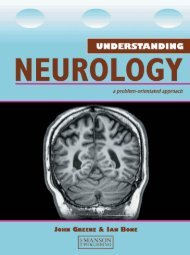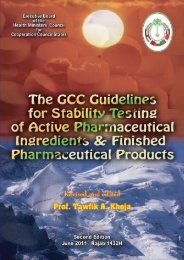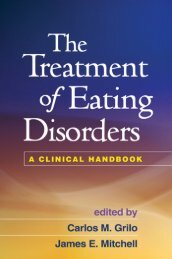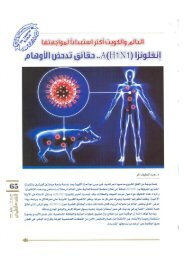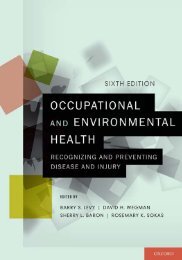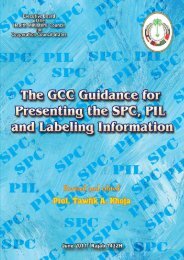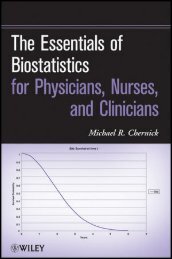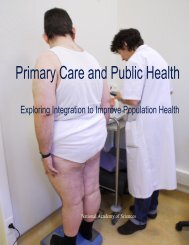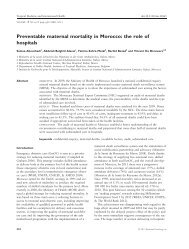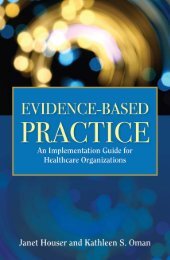NMS Q&A Family Medicine
NMS Q&A Family Medicine
NMS Q&A Family Medicine
- No tags were found...
You also want an ePaper? Increase the reach of your titles
YUMPU automatically turns print PDFs into web optimized ePapers that Google loves.
292 <strong>NMS</strong> Q&A <strong>Family</strong> <strong>Medicine</strong>Examination Answers1. The answer is E. Depressed mood worse as the dayprogresses is the incorrect statement. Generally, in depression,if there is a diurnal variation, it is that symptomsimprove as the day plays out. Diagnosis of major depressionrequires at least four of the following symptoms for aperiod of 2 weeks: impaired sleep; lack of interest (anhedonia);guilt; low energy; difficulty concentrating; poorappetite; psychomotor retardation; and suicidality. Withpsychotic depression, there may be prolonged grief andunreasonably perceived failure to meet self-defined orparental expectations; feelings of the body rotting awaydue to cancer or the like. Suicidality is to be taken moreseriously the more specific the ideation, for example, considerationof method (firearms is the choice of 67% inboth males and females) and absence of envisioningfuture plan. Suicide risk may be overlooked if the depressionis masked by overt anxiety – especially when itattaches to unreasonable obsession with perceived faults,physical appearance, or job issues.2. The answer is A. Bupropion is not an antidepressant,although it is employed as an adjuvant agent in conjunctionwith antidepressants. Zoloft and Prozac, as SSRIs, arehighly popular because of their relatively high therapeuticto side effect ratio. Nortriptyline, as a TCA, is used lessoften due to its high rate of anticholinergic annoying sideeffects, some of which are life-threatening such as dysrhythmiasin susceptible patients.3. The answer is D. Organic hypoglycemia is not a sideeffect of lithium treatment. Polydipsia occurs due to adecreased renal responsiveness to anti-diuretic hormone.Hypothyroidism occurs in 10% of cases as well as euthyroidgoiter in 3%. Upon discontinuance of the drug,manic symptoms will recur within an average of 2.7months while depression returns as long as 14 monthsafter cessation of lithium. Sodium loss makes diureticsrelatively contraindicated. Lithium prevents both manicand depressive symptoms in about 70% of cases, morelikely successfully in those whose attacks have been lessfrequent than once or twice per year.4. The answer is C. A period of 25 to 34 years. However,depression remains a common diagnosis at all ages. Notethat the peak age group for suicide (white boys or men, predominantly)and suicide attempts (white girls or women,predominately) is 15 to 24 years (see chapter 45).5. The answer is E. Adjustment disorder with depressedmood or bereavement. Although this patient has somesymptoms of a major depressive episode, they are temporallyrelated to the recent loss of a loved one. Note also that she isbasically functioning well and without impairment. She hashad no manic or euphoric episodes to suggest a mixed disorder.Dysrhythmic and cyclothymic disorders are both characterizedby a long term (2 years) with mild moodalterations but without sustained remissions. In the former,patients have a chronically depressed mood of varying butmilder intensity. In the latter, episodes of elevated moodalternate with periods of depression.6. The answer is C. Alcoholism should be treated first ifthe two diagnoses exist, if one assumes that the suiciderisk is assessed and accounted for. In many cases, thedepression will abate after the patient has abstained fromalcohol for a significant period. However, the depressionis also treated if it persists after 1 month of alcohol abstinence.When the two diagnoses coexist, there is an increasein the incidence of attempted and successful suicides.Both alcoholic men and women have an increased incidenceof depression.7. The answer is C. About one-third of patients withchronic disease suffer from depression in roughly directproportion to the length of time with the disease. Thecause of this is not known, but contributing factors mightinclude catecholamine depletion from chronic stress. Itmay be situational, based on a philosophically reasonablesense of defeat or discouragement (i.e., an adjustmentdisorder with depressed mood). Some diseases are betterknown than others for depression and suicide. Theseinclude AIDS prominently, renal failure under dialysis,chronic lung disease, multiple myeloma (often severelypainful), other cancer, and coronary heart disease.8. The answer is B. Each of the drugs mentioned is anSSRI, albeit less well known than fluoxetine, sertraline,paroxetine, and fluvoxamine.9. The answer is B. SSRIs are known to cause headache,nausea, tinnitus, insomnia, and akathisia. Paroxetine(Paxil) also causes dry mouth. The greatest advantages ofthis class are the relative rapidity of onset and, the foregoingnotwithstanding, the relative paucity of side effects.10. The answer is A. TCAs are well known to cause anticholinergiceffects, including cardiac dyrhythmias, sedation,and orthostatic hypotension. In regard to significantside effects that can lead to necessarily discontinuing thedrug, this class has a narrow therapeutic window in comparisonwith the SSRIs.



